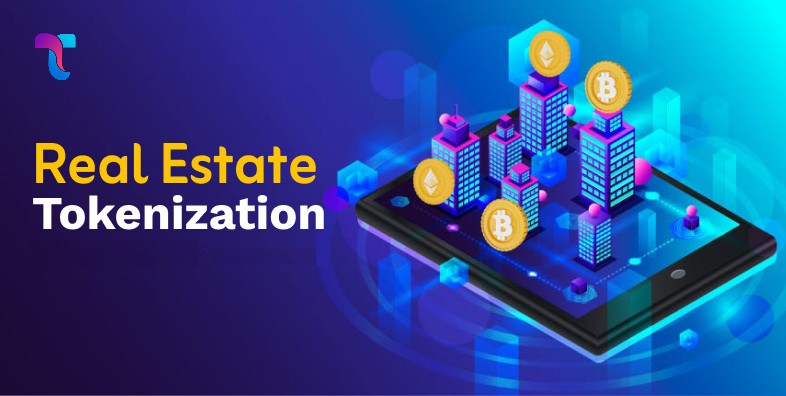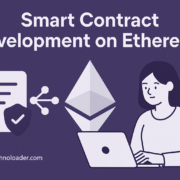What is Real Estate Tokenization? A Complete Guide for 2025
The real estate sector, traditionally known for high entry barriers, limited liquidity, and cumbersome processes, is undergoing a digital revolution. Thanks to blockchain technology, investors today can access global properties in seconds, own fractional assets, and trade them just like stocks—all through a process called real estate tokenization.
But what exactly does it mean to tokenize real estate? How does it work, what are its benefits, and why is 2025 a pivotal year for this trend?
In this complete guide, we’ll break down what real estate tokenization is, explore its working model, and explain how businesses, developers, and investors are leveraging it to reshape the property market.
Understanding Real Estate Tokenization: Concept and Process
Real estate tokenization is the process of converting the ownership of a real-world property, like a residential building, hotel, or commercial office, into digital tokens on a blockchain. Each token represents a fraction of ownership in the asset and can be bought, sold, or traded on digital platforms.
Think of it like owning shares in a company. Instead of buying an entire property or large unit, investors can buy smaller, digital shares of it, often with as little as $100. These tokens are stored and transferred securely on blockchain networks, ensuring transparency, immutability, and faster transaction speeds.
How Does It Work?
- Asset Identification and Legal Setup
The process begins by identifying the real estate asset and creating a legal structure—usually a Special Purpose Vehicle (SPV)—that holds the property. This SPV is then tokenized.
- Smart Contract Creation
Smart contracts are used to manage the token issuance and automate key functions such as dividend payments, voting rights, or ownership transfers. These are built on blockchain platforms like Ethereum or Polygon.
- Token Offering and Distribution
Tokens are offered to investors through a Security Token Offering (STO) or private placement. Interested individuals can purchase these tokens using fiat currency or cryptocurrency.
- Secondary Market Trading (Optional)
Once issued, tokens can be listed on compliant secondary trading platforms or exchanges, giving investors the flexibility to trade ownership in real estate as they would with stocks or bonds.
Types of Assets That Can Be Tokenized
- Residential properties (single-family homes, apartments)
- Commercial buildings (offices, malls)
- Hospitality real estate (hotels, resorts)
- Industrial spaces (warehouses, factories)
- Real estate investment portfolios, or REITs
Key Benefits of Real Estate Tokenization in 2025
Tokenization is quickly becoming a game-changer in the global property market. Here are the major reasons to go for real estate tokenization platform development.
Fractional Ownership and Accessibility
Traditionally, real estate required large capital outlays, making it inaccessible for small or retail investors. Tokenization allows properties to be split into thousands of pieces, enabling investors to buy a share with minimal investment. This opens doors to global real estate markets for average individuals.
For example, a $1 million property can be split into 100,000 tokens worth $10 each, allowing people from around the world to invest and own a piece of that asset.
Increased Liquidity
Real estate has long been considered an illiquid asset, meaning it’s difficult to quickly sell or exit. But with tokenization, investors can trade their shares on digital marketplaces, bringing a new level of liquidity to the property sector.
This flexibility benefits both developers (who can raise funds faster) and investors (who gain faster exit options).
Transparency and Security
Blockchain records are immutable, meaning once something is recorded, it cannot be changed. This feature ensures full transparency in ownership records, transaction histories, and revenue distribution.
Smart contracts also eliminate manual errors and reduce the risk of fraud, making the entire process more secure for all parties involved.
Global Reach and Borderless Transactions
A real estate token listed on a compliant platform can be purchased by anyone around the world (depending on regulatory approval). This gives property developers access to a wider pool of investors while enabling users to diversify their portfolios across regions.
In 2025, with increasing regulatory clarity and digital adoption, this borderless investment model is expected to thrive.
Cost and Time Efficiency
Traditional real estate transactions involve brokers, banks, lawyers, and tons of paperwork. Tokenization reduces these middlemen and speeds up processes via automated smart contracts. This leads to reduced fees, faster settlements, and more cost-effective real estate deals.
Real Estate Tokenization in 2025: Market Outlook and Challenges
As we step into 2025, real estate tokenization is evolving beyond just an experimental concept. Several governments, financial regulators, and real estate giants are exploring or actively implementing blockchain-backed solutions.
According to market analysts, the tokenized real estate market is expected to grow significantly, driven by increased investor demand, institutional involvement, and improved legal frameworks.
Major Adoption Trends in 2025
- Rise of Real Estate Tokenization Platforms
Platforms like RealT, PropShare, and Harbor are revolutionizing property investment by offering secure, blockchain-based token offerings. These platforms ensure compliance with regulations and simplify the investment process, allowing global investors to access fractional real estate ownership with ease.
- Integration with DeFi (Decentralized Finance)
Tokenized real estate is now integrated into DeFi ecosystems, enabling users to use their property tokens as collateral for crypto loans or yield farming. This expands the utility of real estate tokens beyond ownership and into automated financial services.
- NFT-Linked Real Estate Assets
Innovative projects are using NFTs to represent property rights, enabling digital ownership transfers, rental agreements, or interactions in the metaverse. This approach simplifies verification and enables novel use cases such as virtual walkthroughs and blockchain-based leasing systems.
- Hybrid Investment Models
Developers are merging tokenization with crowdfunding strategies, offering both equity-backed and utility tokens. This hybrid approach widens investor participation, supports flexible funding structures, and fosters community involvement in property development and revenue-sharing opportunities.
Challenges to Consider During Real Estate Tokenization Platform Development
- Regulatory Uncertainty
Tokenized real estate must navigate complex, evolving legal frameworks that vary by country. Ensuring cross-border compliance, investor protection, and asset-backed validation remains a significant challenge as global authorities work to formalize consistent blockchain-based property laws.
- Technology & Security Risks
Poorly written smart contracts or unregulated platforms can expose investors to data breaches, contract failures, or fund losses. Ensuring security audits, platform transparency, and developer accountability is essential to protect users and maintain industry credibility.
- Market Liquidity Concerns
Despite promises of liquidity, actual trading volumes for real estate tokens remain low on most platforms. Achieving healthy secondary market activity depends on investor trust, strong platform adoption, and integration with broader digital asset ecosystems.
- Public Awareness
A major roadblock is the lack of awareness and understanding among traditional investors. Educating stakeholders about how tokenized real estate works, its benefits, and its risks is crucial for accelerating adoption and building long-term trust in the ecosystem.
Final Thoughts
Real estate tokenization is not just a buzzword; it’s a transformative trend that’s reshaping the way we invest in property. By leveraging blockchain unlocks fractional ownership, global participation, enhanced liquidity, and cost savings, all while increasing transparency and security.
As we move further into 2025, tokenized real estate will likely become a mainstream investment class. Whether you’re a developer, investor, or entrepreneur, the time to explore this innovation is now.
With the right strategy and a trusted technology partner, real estate tokenization can offer a smarter, more efficient, and more inclusive future for property investment.
Ready to tokenize your real estate project? Partner with Technoloader, a leading blockchain development company, to build secure, scalable, and regulation-ready real estate tokenization platforms.









Leave a Reply
Want to join the discussion?Feel free to contribute!